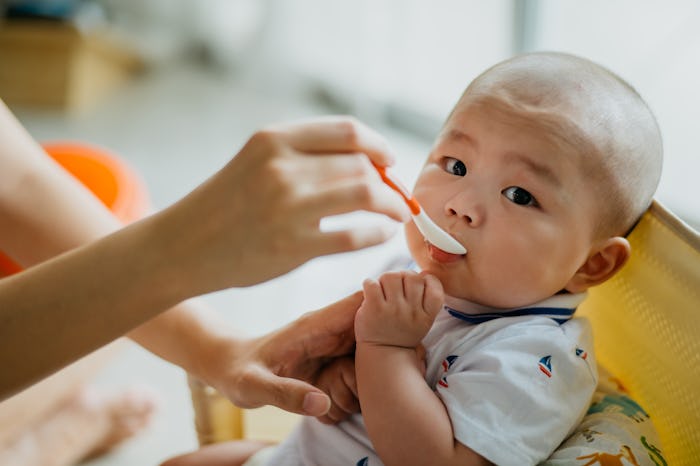Baby

Here's How Long Baby Food Lasts After Being Opened
Read the label carefully.
I love buying baby food more than just about anything. The bright colors, the velvety purées, and the seemingly endless choices can keep me happily browsing the shelves until my shopping partner needs a diaper change. But no matter how meticulously I plan my grocery trips, I inevitably end up with extras that my baby doesn’t eat right away. It begs the question: How long does baby food last after being opened? Is it something you can save for later and feed to them the next day, or should you just toss it?
How long your baby food will last depends on a few things. For instance, are you saving veggies or meat-based products? Is it store-bought or homemade food? According to the Food and Drug Administration (FDA), you can store opened (store-bought) fruit and vegetable baby food in the refrigerator for two days, but you should toss store-bought meat and egg products after one. Homemade baby foods can last one to two days when properly refrigerated. It’s important to check the packaging on every product, though, as the specific guidelines may vary depending on ingredients and packaging. Here’s the nitty gritty on the safety of baby food leftovers, as explained by pediatricians and baby nutrition experts.
How long does store-bought baby food last?
“Unopened, most baby food should have 12 to 24 months of shelf life,” says Jason Jacobs, vice president of quality and technical services at Beech-Nut Baby Nutrition Company. Generally speaking, you can refrigerate opened store-bought fruit and vegetable baby food for two days, and opened store-bought meat and egg products for one day, per the FDA.
Keep in mind that storage recommendations differ depending on the packaging you choose. Those handy pouches? You should refrigerate baby food pouches within an hour of opening and toss them after 24 hours, no matter what they contain, according to Sarah Smith-Simpson, principal scientist of sensory and consumer insights at Nestlé Gerber.
Opened baby food should never be stored in the refrigerator if your baby has had any direct contact with it. The best way to save food is to spoon it onto a plate or bowl and let your baby take it from there. “If your baby’s saliva has touched it, then it should be thrown out right away,” advises Dr. Preeti Parikh, M.D., board-certified pediatrician and executive medical director at GoodRx. “The saliva from the baby's mouth can introduce harmful bacteria into the baby’s food,” she adds.
Remember, you can always check this stuff with your pediatrician — they're invested in the health of your baby, and foodborne illness presents serious risks. Many baby food manufacturers like Gerber offer 24-hour helplines, so if in doubt, give them a call.
You should also be sure you don't leave opened baby food out longer than two hours at room temperature, advises Jacobs. And if you're taking a picnic this summer, toss opened baby food after one hour if temperatures reach 90 degrees Fahrenheit or higher.
How long does homemade baby food last?
“If homemade baby food is cooked and canned [or] sealed properly, it can last as long as 12 months in a glass jar [before opening],” Jacobs tells Romper. You can also store homemade baby foods in the freezer for three months. Once it’s been opened, the FDA advises using homemade baby food within one to two days.
The same rules apply to homemade baby food in that you should never save leftovers from your baby’s plate or bowl. Food that has come into contact with her mouth, spoon, or hands might harbor harmful bacteria that can flourish even in the fridge or freezer. “Leftovers should not be put back into the original container or stored separately in the fridge,” board-certified pediatrician Dr. Pierrette Poinsett, M.D., tells Romper. Leftovers should be thrown out.” Rule of thumb: If your baby has eaten directly from the bowl or jar, pitch the leftovers.
Can you freeze opened baby food?
If there has been no saliva introduced to the food, Parikh says you can freeze opened baby food. “Freezing temps allow less likelihood of bacteria growing, so you can store it for a longer time,” she says. “The most important criteria is that no saliva has been introduced to the food.”
However, Smith-Simpson does not recommend freezing store-bought baby food. “First, many containers and pouches that are traditionally used for baby foods don’t hold up if frozen,” she tells Romper. “Second, once frozen, baby food can separate and change textures.” If you are going to freeze baby food, do so by putting it in small freezer bags or ice cube trays. Do not use glass containers, Poinsett tells Romper, as “the glass can shatter, and tiny glass chips can get into the food.”
If you can't remember how long that tub of baby food has been sitting in the fridge — I know my memory is shot — err on the side of caution and throw it out. Otherwise, follow the package directions carefully or look to FDA guidance to let you know how long you can keep it around.
Experts:
Jason Jacobs, vice president of quality and technical services at Beech-Nut Nutrition Company
Sarah Smith-Simpson, principal scientist of sensory and consumer insights at Nestlé Gerber
Dr. Preeti Parikh, M.D., board-certified pediatrician and executive medical director at GoodRx
Dr. Pierrette Poinsett, M.D., board-certified pediatrician and medical consultant for Mom Loves Best
Additional reporting by Mackenzie Sylvester.
This article was originally published on